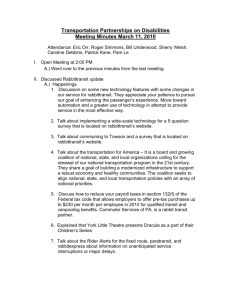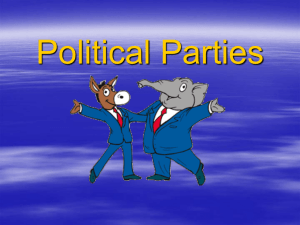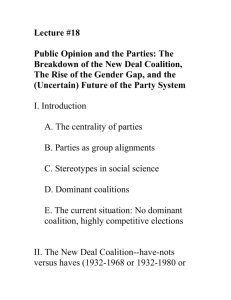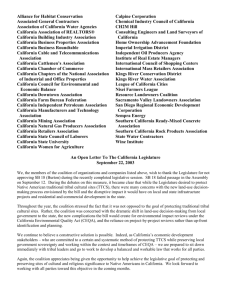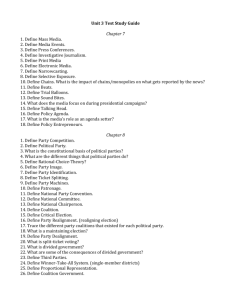a fresh policy challenge:coalition building for women
advertisement
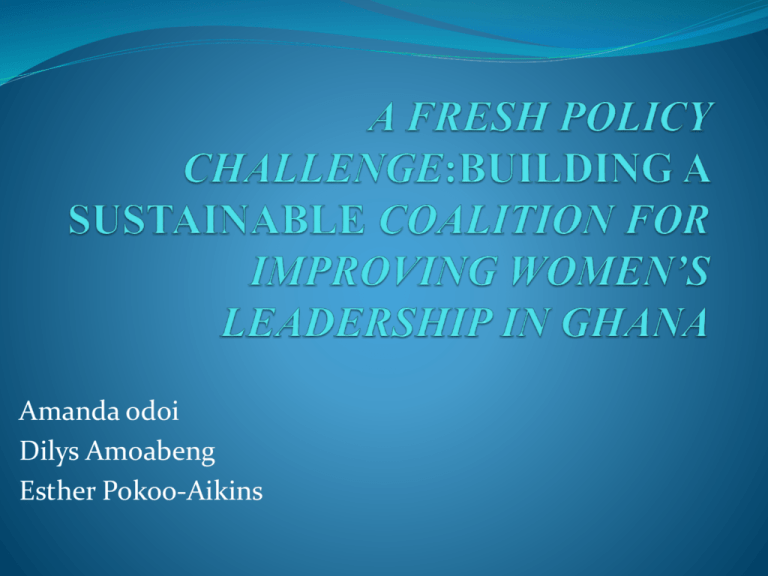
Amanda odoi Dilys Amoabeng Esther Pokoo-Aikins Outline Championing women’s participation What Ghana stands to gain Rationale for the policy paper Possible structure of the coalition Expected challenges Activities of the coalition Objectives of the policy paper Why we are recommending coalition building Conclusion If you want to develop Africa you must develop the leadership of African women (Soukeyna Ba cited in Manuh, 1998, p. 1) Championing Women’s Participation Quota – 40% representation of women in all sectors of the country (1998) Ongoing support for women in local governance through allocated funds (2002). Ministry for Women’s and Children’s Affairs (MOWAC) program to support women’s political campaigns (2010 to date) Rationale For The Policy Paper Women’s participation in the national parliament stands at 8.7% Male bias in conceptualisation of leadership Diversity among women poses challenges to participation of recognition of benefits of women’s effective participation in decision making Lack Challenges in engaging men Objectives of the Policy Paper Establish a sustainable coalition to improve women’s political participation. More specifically: • Recommend possible structure of the coalition • Recommend some activities of the coalition Why Are We Recommending Coalition-building? South Africa - National Women’s Coalition (NWC) develops Women’s Charter Nigeria and Rwanda – women’s dialogue forums Zambia and Zimbabwe – women-only political parties What Ghana Stands To Gain Greater reach and credibility Coordinated approach to advocacy Exercise citizenship Structure of the Coalition LOCATION Ministry of Women and Children Affairs (MOWAC) Membership base Government MOWAC CHRAJ NCCE PWC Non-Government NETRIGHT Media Gatekeepers of communities-queen mother’s, Community organisations-religious groups, -women aspirants Other human rights advocates- LAWA, FIDA International Donors & Diverse UN agencies Informal Support Persons & groups interested in women’s political leadership but would rather remain anonymous ( or at the background) e.g. men’s groups Activities Of The Coalition Civic education – e.g voter education Leadership training & mentoring of women political leaders Ensuring accountability to government commitments through media engagement & media capacity development Engaging men in supporting the coalition Expected Challenges For The Coalition Men’s resistance “I don’t know how many men will be willing to vacate their seats for a woman to contest because me I won’t” (a male parliamentarian in Ghana) Lobbying political parties on giving up winnable seats for women Convincing women to take up public office Persuading electorates on the need for women’s involvement in political decision-making Institutions, social and political structures that reinforce gender stereotyping Conclusion Key benefits of the coalition • Lobbying for a review of relevant laws to enhance women’s opportunity for political participation • Holding government accountable for its commitment • Holding the media accountable for its portrayal of women • Mechanism for networking amongst women’s organisations to support implementation for programs at the grassroots levels

